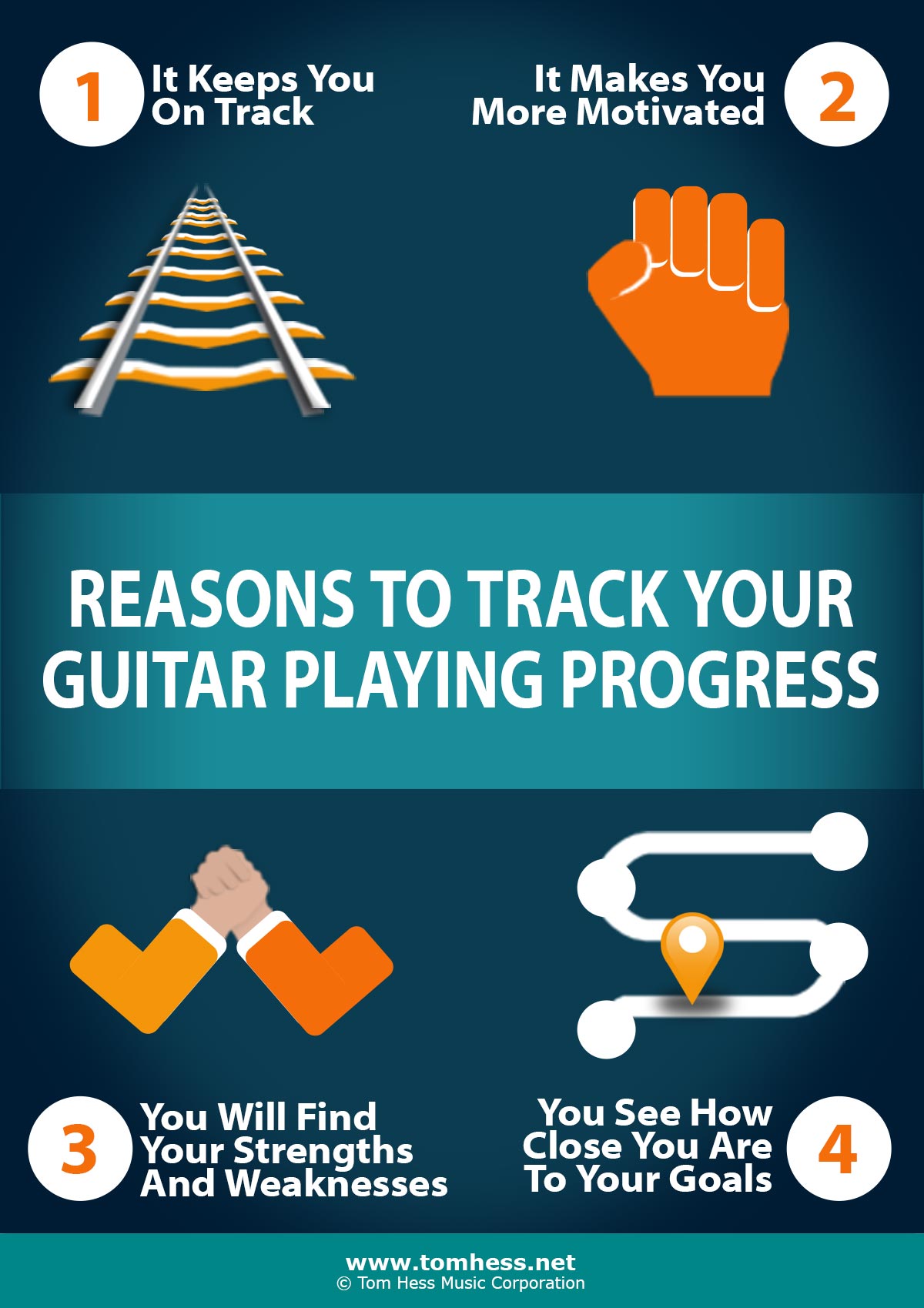- When you are bored, you do less guitar practice. Less time spent with guitar practice = slower guitar playing progress.
- (In extreme cases) you may lose your passion and quit guitar practice altogether. Zero time spent on guitar practice = zero guitar playing progress.
To make your guitar practicing fun, begin tracking your guitar playing progress on a regular basis. Here is how this helps your guitar playing:
- Your guitar practice will become a lot more focused. To track guitar playing progress, you must create short-term goals and work towards them. This gives you something to measure progress with and helps your guitar playing improve a lot faster.
To see an example of how to do this, download this free report about increasing your guitar speed.IMPROVE YOUR GUITAR SPEED
BY AT LEAST 100% ENTER YOUR NAME AND
ENTER YOUR NAME AND
EMAIL TO GET ACCESSFREE E-GUIDEBy submitting your info, you agree to send it to Tom Hess Music Corporation who will process and use it according to their privacy policy.
- You will compete against yourself. Tracking your guitar playing progress every week is like keeping score in a game. Imagine playing a game and not keeping score… not very fun, is it? Yet this is how most guitarists (who don’t track their progress) practice guitar.
When you get weekly feedback about how much guitar playing progress you made in your guitar playing, you are motivated to continue practicing.
-
 When your practicing produces greater results, the process itself becomes more fun. When guitar practice is fun, you practice more…which leads to even more progress!
When your practicing produces greater results, the process itself becomes more fun. When guitar practice is fun, you practice more…which leads to even more progress!
- You will become confident in your potential to become a great guitarist. Your attitude about your musical potential is the biggest factor that determines how good of a guitar player you will become.
Here Are 8 Simple Steps For Tracking Your Progress From Guitar Practice:
Step 1: Break down your musical goals into a list of specific skills to master during guitar practice (a great teacher helps you with this).
Step 2: Acquire the right exercises to develop those skills (and learn the right ways to practice them). Guitar practice exercises can include physical things to play on guitar or specific topics to study (such as music theory, fretboard visualization, aural skills, lead guitar phrasing, etc.).
Step 3: Set specific short-term goals for each exercise that lead you towards your long-term goals. To understand how to do this, read this article about setting and reaching musical goals.
Step 4: Set a period of time for working on exercises with guitar practice (such as 1 week).
Step 5: Test your guitar playing progress towards your goals in Step 3. Use a metronome to do this with skills that are technique-related.
For skills that cannot be measured with a metronome, find ways to assess your progress using specialized tests (more on this below).
Step 6: Record your progress on a progress chart that you update every week. This is how you “keep score” in your guitar practicing.
 How To Become A Great Guitarist
How To Become A Great Guitarist
 10 Solutions For Musical Frustration
10 Solutions For Musical FrustrationDiscover 10 ideas that will help you solve guitar playing frustration.
 How To Reach Guitar Playing Goals
How To Reach Guitar Playing GoalsLearn how to reach your goals for guitar with this free mini course.
Step 7: Adjust your guitar practice schedule (if needed) based on your guitar playing progress. This will ensure that you continue improving your guitar playing every single week.
Step 8: Repeat steps 4-7 for each short-term goal, until your long-term musical goals are reached.
To make tracking your progress simple and fast, use a specialized tool that tracks your progress for you and gives you the best, most accurate tests for assessing every single aspect of your guitar practice.
To learn how it works, read this page about speeding up your guitar playing progress.
By consistently tracking your guitar playing improvement, you will reach your musical goals faster with guitar practice than you ever thought possible.
To see an example of explosive results you can expect by following this process in your guitar practice, download this free report about building your guitar speed.



